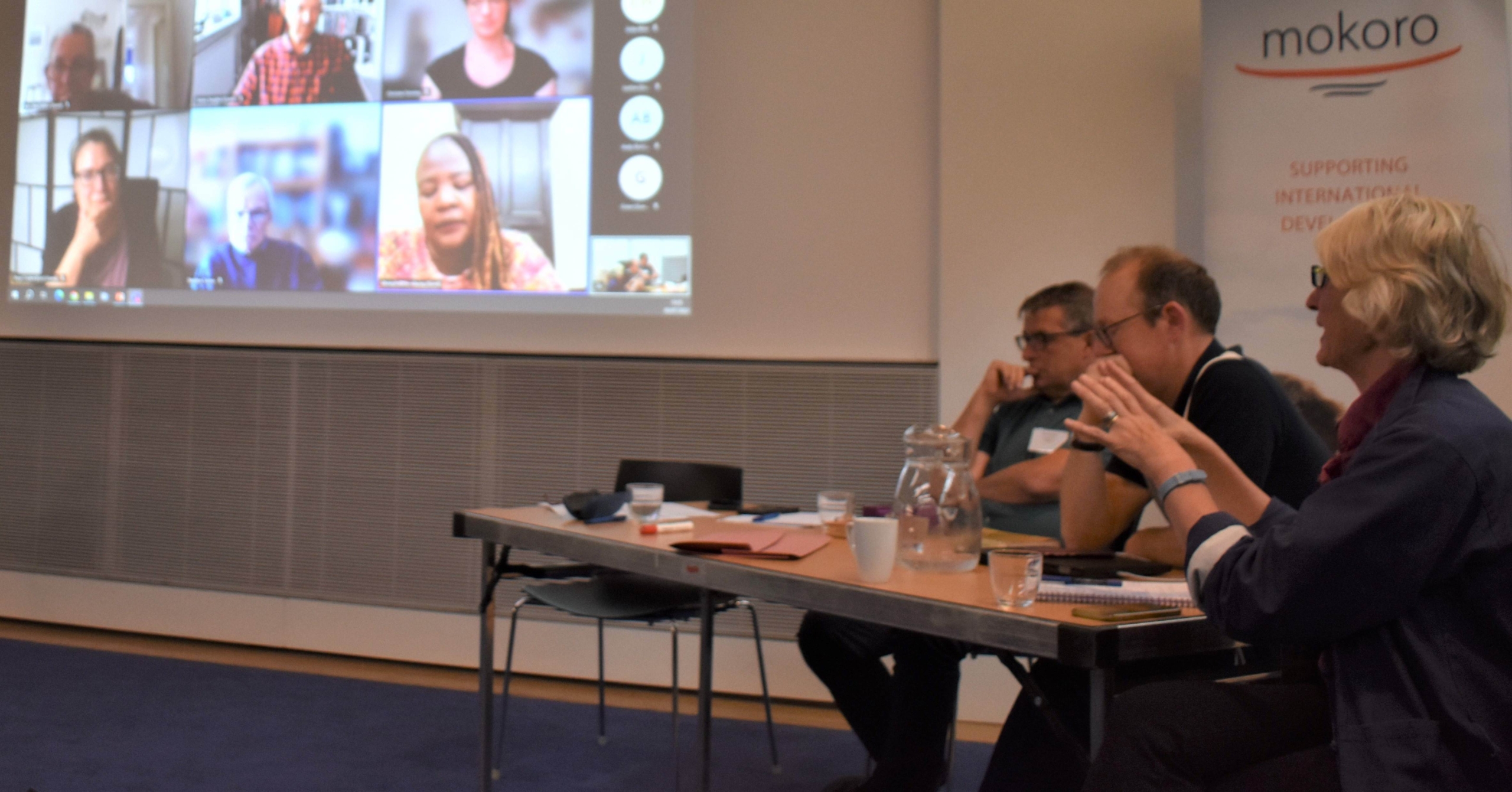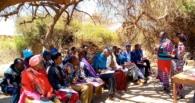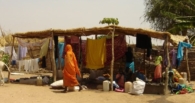Remembering Robin Palmer
Martin Adams
8 March 2023
/
- 0 Comments
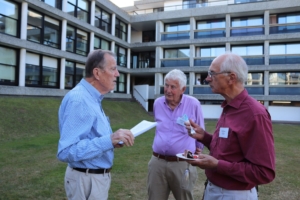
Martin Adams, Robin Palmer and Geoff Payne at Mokoro’s 40th
Anniversary celebrations, June 2022.
Robin Palmer passed away on Sunday 19 February. Robin joined Mokoro as a Principal Consultant in 2007, and after retiring he continued to be closely involved with the company. Robin’s long-time colleague and friend, Martin Adams, also a retired Mokoro Principal Consultant, has written this piece commemorating the life of a highly influential and dedicated land rights activist.
Reflecting on Robin Palmer’s life as a ‘land activist’, one realises that his detailed research in Southern Africa initiated a life of concern about the injustice of land theft by the rich and powerful. Then as now, approximately 75% of Southern Rhodesia was unsuitable for agriculture. However, land over about 1220 m on the high-veld was cool and well-watered and was first settled by the Ndebele tribe. Then in the late 1940s and the 1950s it was taken by the UK’s colonial government for European settlers. Robin’s detailed study of colonial land theft in former Southern Rhodesia (now Zimbabwe) in the 1960s was outstanding. This was some twenty years before many of us, who were engaged in rural development in Africa, the Middle East and South and East Asia, began to grasp the importance of supporting land redistribution to small farmers, following the decolonisation of countries in which their colonial past cast a dark shadow.
Robin explained his early interest in land issues in Rhodesia at a Mokoro seminar on Land Reform in Southern Africa in 2017 as follows:
In 1960 I took a boat from Southampton, then a train from Cape Town, then another train from Bulawayo and finally arrived in Salisbury, Southern Rhodesia, where I studied for a history degree at the University College of Rhodesia and Nyasaland. One of my teachers was the late Terry Ranger, who was an extremely prominent political activist. I went on to write a PhD on the politics of land in Rhodesia and got deported after Ian Smith’s Unilateral Declaration of Independence in 1965. The PhD eventually became this book, published 40 years ago by James Currey.
The book was entitled Land and racial domination in Rhodesia.
Robin then spent almost 10 years teaching African History at the Universities of Malawi and Zambia and in 1987 he joined Oxfam UK for some 20 years. During his first eight years he was attached to Oxfam’s Southern Africa Desk in Oxford, initially as a Desk Officer and then as the Regional Manager. This involved frequent travelling to Zimbabwe, Zambia, Malawi, Angola and Mozambique, ‘often quite deep in the bush, meeting people in both civil society and government’. That ended in 1995 when he became Oxfam’s Land Rights Adviser for Africa, which involved more travelling, and making use of the contacts he had established in both the academic and the NGO worlds. He explained that it was essentially a networking and communications role. The context was one of increasing pressures on land, of new land laws and policies being drafted, and national NGO land coalitions and alliances being established. It was also a context of post-Cold War triumphalism. The donor answer on land was a simple one – privatisation.
During this period, Robin bought number 250 Zambezi Road, Lusaka for Oxfam. He edited a book entitled Recollections of the ANC and Oxfam at 250 Zambezi Road, Lusaka, 1967-97, about a house with a history and about the people who lived or worked there. The book discussed the links which were established between Oxfam GB in Zambia and the African National Congress (ANC) in South Africa. A reviewer of the book in Pambazuka News wrote:
One perhaps surprising thing the reader begins to appreciate from this book is what the men and women working for such different kinds of organisations – the ANC and Oxfam – shared: their selfless commitment to the people of the sub-continent, an abiding respect for all human beings across potential differences in formal education and role in society and the human warmth and inclusiveness that permeated their work and lives.
While still with Oxfam UK he established the Land Rights in Africa website which collected information relating to the struggle for the return of land rights to indigenous small farmers on the Continent. In 2012, Robin continued management of the website, which by then had accumulated some 10,000 entries, when it was transferred to Mokoro.
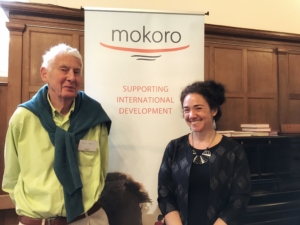
Rachael Knight joining one of the many Mokoro seminars to be chaired by Robin, May 2019
As a Mokoro Principal Consultant, he spread his wings and organised and chaired regular seminars and workshops on current issues, often related to Mokoro’s international assignments involving land rights issues: (e.g., on gender, HIV/AIDS, livelihoods and food security, including his 15 years’ experience as an academic, with a focus on agrarian history).
In 2022 Robin passed on the task of managing the Land Rights in Africa website to his Mokoro colleague, Christopher Tanner. Chris has several decades of experience in rural participatory development in Southern Africa and recently in South East Asia.
For all at Mokoro, Robin will be sorely missed and we hope to keep his legacy alive through the Land Rights in Africa website and future events on land issues. It has been touching to receive so many messages from across the world paying tribute to Robin. We have been passing these messages on to Robin’s family. The tributes that follow have been shared with explicit permission for publication in this piece. They reflect many other tributes that have been received, recognising Robin’s kindness, generosity, activism, modesty, dry humour, intellect and thoughtfulness. He will be fondly remembered by many around the globe.
Please get in touch with Jim Grabham (jgrabham@mokoro.co.uk) if you would like to send a message of condolence to Robin’s family.
Elizabeth Daley (Mokoro)
I knew Robin very well as part of Mokoro’s land group. And even before Mokoro while he was at Oxfam, Robin has been a mentor and an inspiration to me for some 25 years. I first met him back in February 1998 at a big conference on land in Zimbabwe that he organised at SOAS. I was setting out on doing a PhD on land in Tanzania and he gave me many good leads to follow up and contacts in Tanzania. This was almost before email but definitely before mobile phones! We have been in frequent contact throughout the years since. Robin greatly encouraged Birgit Englert and me to publish an edited volume on Women’s Land Rights and Privatisation in East Africa in the mid-2000s, and a subsequent edition of the Journal of Eastern African Studies. He wrote our Foreward, peer reviewed all our work, and helped organise book launches. At Mokoro he was the driving energy behind numerous seminars on land over the years, and a real supporter of keeping the Land Rights in Africa website that he set up at Oxfam going and of expanding our land team in-house. I have missed the regular contact with him since he retired but he is often thought about and talked about – we ask “what would Robin do” or “what would Robin want” when we are making plans for the LRIA website and the Mokoro land group. Robin was an amazing man who made such a difference in the world and has inspired so many people, probably more than even he could know. He will not be forgotten.
Helen Dancer (University of Sussex)
Robin was someone who was particularly generous with his time and enthusiasm in supporting younger colleagues and I appreciated the kind and active interest that he took in supporting my and others’ work on women’s land rights especially as early career researchers.
Magdalena Anna Kropiwnicka (Independent consultant, Food and Climate)
Robin has been very important in helping me nearly 20 years ago with supporting knowledge in development of ActionAid’s work on women’s land rights and land tenure work in Africa in general. I would love to acknowledge the importance of his pioneering work on systemization of knowledge about land conflicts in Africa in any way I can. Robin has not only been himself a repository of knowledge about land tenure in Africa but he has also been a very supportive colleague.
Geoff Payne (Independent consultant, housing and urban development)
Of all the people who have been campaigning to improve access to secure land, my great friend and colleague, Robin Palmer was himself a landmark figure. I first got to know him in the late 1990s when he was the land rights adviser at Oxfam and we kept in touch throughout his time at Mokoro. Robin once posted a message saying he “felt strongly that there was a need to disseminate arguments in favour of pro-poor land reform in a context in which the rich and powerful tend to control both power and information”, a sentence which encapsulates his focus and role. He was a great help to me in addressing land rights in several African countries and in Cambodia and he knew just about everyone who operated in the land sector internationally, making him the ‘go-to’ person if you needed a contact on a special aspect, policy or country. We last met when he attended a party last summer and he was as active as ever. Robin has left a legacy of which anyone would be immensely proud and while he has sadly left us, that legacy will live on.
Mike Taylor (International Land Coalition (ILC))
Robin inspired more than a generation of land rights activists and practitioners. In the early years he was often a lone voice. But his determination and straight good sense was instrumental to getting attention to a critical issue that many preferred to ignore. He was a partnership builder, and a respectful one. Many of ILC’s 300 member organisations, especially in Africa, worked with Robin, or built on his work. His outspoken championing of women’s land rights set a path that two decades later is starting to get the recognition it deserves. I always appreciated Robin’s frankness. He called a spade a spade, and we always need more people like him. From my own heart, and on behalf of the coalition I serve, we honour his legacy.
Max Lawson (Oxfam International)
I first met Robin when I was living and working for Malawi in the year 2000. He was only there a week, but we spent a lot of time together. The country was preparing a new land law, and we did a series of meetings with government, donors and civil society. Land was a completely new issue for me, I was working to support Oxfam’s advocacy in the country, but knew little about the topic.
That week was transformative for me; I learned so much from Robin in those few days and a friendship was formed then that continued in the years after. I learned a lot about land of course, and struggles over land redistribution, but the thing that I remember most was learning about colonialism, African history, the history of Malawi- he literally kindled an interest in me in these topics that has stayed with me ever since, and as I look at my bookshelves full of books about colonialism, Africa and the anthropology of colonial impacts on society, I wonder how many of those books I would own if hadn’t been for that week we spent together. Not just ancient history too, but recent history, not least the experience in Zambia with Oxfam supporting clandestinely and openly the ANC in exile. He was a living history of Oxfam, some of our most wonderful swashbuckling and radical moments as an organisation that we should be most proud of.
Robin was a wonderful, kind, learned and thoughtful man and I owe him a big debt. He had a major influence on my life, and I will always be grateful to him for that. May he rest in peace and power.
Christopher Tanner (Mokoro)
I will not add to the many testimonies to Robin’s deep passion for land rights and defending the interests of poor rural communities and households, nor his august academic career in Southern Africa and later back in the UK both with OXFAM and Mokoro. I would just like to say a few words about his kindness and gentleness, illustrated by a particular moment we spent together. Several years ago, at a time when I was a bit low, he invited me to go to a performance at the South Bank in London, by a well-known Portuguese fado singer. We had supper together beforehand, and had a fine time talking about land issues and many other things, then listening to music we both loved. He would not allow me to contribute, and his gesture has marked me deeply ever since. He was above all a kind and gentle man, who cared deeply about the world around him. I will miss him greatly.
Jim Grabham (Mokoro)
Despite ‘retiring’ some years ago, Robin’s presence at Mokoro never seemed to diminish. This is a testament to the passion he had for his work. Last year, we were able to celebrate and recognise Robin’s immense contribution as curator of the Land Rights in Africa website as he passed on responsibilities to Chris Tanner. The resource is an important fixture of the Mokoro website and Robin would dedicate his time in ensuring that this library is up-to-date with the latest debate and issues in the sector. Aside from his influence on the land sector, Robin appeared to greatly enjoy being a part of Mokoro. He was always keen to hear the thoughts of the younger members of Mokoro and gave confidence to everyone to speak their mind. This was always immensely appreciated.
Birgit Kristine Englert (University of Vienna)
I am deeply saddened by Robin’s passing. He was among the most generous people I knew – generous with sharing his work, giving advice as well as very practical support and good humour. I first met Robin in 2003 when he came to Vienna to give a talk and he then invited me to the women’s landrights conference in Pretoria later the same year which he organised together with Kaori Izumi. I then met him again in Oxford in 2004 when I came for an African Studies conference and he invited me and my partner for dinner at his place and then again in 2008 when we had our book presentation. I think the ListServ and most importantly the huge database on publications which Robin had started were so crucial in moving these debates.
Ray Purcell (Mokoro)
By great serendipity, my wife, Nelly, and I were lucky to be sat opposite Robin at last December’s Mokoro Christmas lunch. A few days before, he had been to a presentation and tasting organised by the Oxford Wine Company – and it had featured Georgian wine.
We spent the best part of an hour extolling the said wine’s beauty. This was to especially Nelly’s delight, being proud of her Georgian heritage and of Georgia’s substantiated claim to be the “cradle of wine”. Archaeologists have traced the world’s first know wine production to the people of the South Caucasus around 6,000 BC.
Robin was obviously a wine buff and had converted his newly found Georgian wine interest into the purchase of 14 bottles. We are so grateful for that meeting together. The image of the Great Man’s enthusiasm for his discovery of Georgian wine will live with us for a long, long time.
Rachael Knight (Community land protection and legal empowerment specialist)
Robin Palmer was an incredibly bright light in the world. To me, he was a role model, a mentor, a cheerleader, and a friend. Before I ever met him, I admired him for his extraordinary work in the field of land rights- and so was blown away (I think I wept with gratitude) when he published something I wrote in my early 20’s in his Oxfam land rights clearinghouse. I was even more amazed that he took the time to teach and mentor me over the years, and, most recently, even hosted an event for me to give a talk! That was who Robin was: endlessly generous, extraordinary kind and caring, and truly supportive. Every time we met up, I felt infused by the depth of his kindness and the vastness of his energy and joy. All of us who had the good fortune to be mentored by him were transformed by his care. He was a truly wonderful, good human being. He will be very, very missed.
Zoe Driscoll (Mokoro)
Robin’s passion for his work and never-fading generosity will stay with me forever. I’ve known Robin since 2012 when I joined Mokoro and have seen the many voluntary hours he put into ensuring the Land Rights in Africa website was kept current with debates and dialogue on land rights, representing Mokoro at global land events, providing a platform, especially for younger land professionals, to share their research through seminars, and providing thoughtful feedback on papers/books. He was so humble in everything he did and always eternally grateful for the small things I ever did to support him. I will miss the guidance and support he offered, his reliable reviews of Oxford’s best restaurants, bumping into him at evening seminars in Oxford, and of course his humour and companionship at Mokoro social events. I hope we can keep his legacy alive.
Marc Wegerif (Food systems and land rights expert)
Robin was a generous spirit. He supported and promoted land rights, good land governance, and the wider struggle for social justice. He was always sharing information and advice and through this he assisted many, including myself. I valued his advice and encouragement from when I first met him in land sector events to later on when I joined Oxfam while Robin was still there.
Beyond land issues, Robin played an important role in the development sector. He stood for an approach to development rooted in genuine solidarity between people. He recognised that development needed to be transformatory and needed committed people more than metrics of success and logframes. He was not the fly in and flyout ‘development’ professional. He lived and worked in Southern Africa for many years, getting to know the region and indeed becoming an expert in it. But not an arrogant expert, he was a development comrade who brought his knowledge to the table and also listened to the voices of those in poverty and those working with them on the ground.
As an academic Robin also believed in and did his best to link his research and intellectual work with real world struggles.
You lived a good life, you are well remembered. Rest in Peace Robin Palmer

